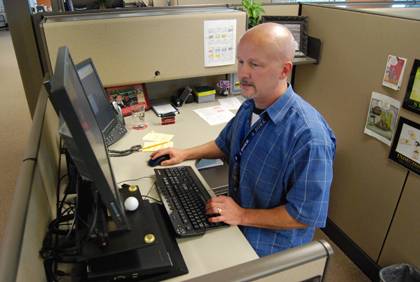Get Up, Stand Up
Health experts suggest standing and moving at least every hour

Before you sit, roll up to your work computer and get too comfortable, consider this: as soon as you plop down, calorie burning drops to about one per minute and enzymes that break down fat fall drastically.
With less than 20 percent of today's jobs requiring physical activity, the amount of time sitting has significantly gone up in the past 50 years - and waistlines with it, according to a study led by Louisiana State University . Americans sit for an average of about nine hours a day and burn 140 fewer calories a day compared to the 1960s, which can add up to about 14 pounds a year.
"The general rule of thumb is you shouldn't sit longer than an hour without getting up and moving around," said Dr. Redford Williams, professor in Duke's Department of Psychology and Neuroscience. "If you're sitting, not moving and not burning fat, it's just a bad thing all around."
That's why Duke offers free programs to get faculty and staff moving. LIVE FOR LIFE, Duke's employee wellness program, features programs like "Take the Stairs," a stair-stepping program that helps employees reach fitness goals and earn prizes. Also available is "Take Ten," a self-paced incentive program that offers LIVE FOR LIFE dollars the more participants walk.
"Whether you're at work or home, more sitting increases the threat of cardiovascular disease," said Liz Grabosky, LIVE FOR LIFE fitness manager. "While standing, a person can burn up to 60 more calories an hour compared to sitting."
Michael Palko, a Maestro Care principal trainer with Duke's Health System, decided last year to stand up - literally - to health issues that can come from too much sitting.
At his desk in University Tower, Palko has adjusted the height of his desktop to about four feet from the floor. Instead of parking in a chair when he arrives at work, he steps up to his raised desk and computer, where he'll spend almost the entire day standing. He said it's especially beneficial after a 45-minute commute to work.
"In my previous job, I worked at home on occasion, and I created a makeshift standup desk that I really liked," Palko said. "When I came to Duke I read a Duke Today story about another employee who had a standup desk, and I thought maybe I should do that full time."
For Deneen Spatz, cutting out prolonged sitting is a rewarding experience. Last year, she joined the Take Ten program after she noticed too much sitting made her feel antsy and her daily energy levels were dropping. Through Take Ten, she tries to walk to Duke Gardens each day and she'll also walk to Duke Clinic or Duke Hospital to pick up or drop off paperwork instead of asking someone else to do it. She's working toward earning enough LIVE FOR LIFE dollars to get an iPod shuffle from the LIVE FOR LIFE store.
"I've noticed that my happiness has gone up, and I don't need that 3 o'clock cup of coffee to get me through the end of the day anymore," said Spatz, a postdoctoral associate in the Duke Division of Cardiology.
Williams, the professor in Duke's Department of Psychology and Neuroscience, said healthy lifestyle choices are important. Prolonged bouts of sitting tied to stressful situations like a traffic jam during a commute raises adrenaline and blood pressure.
"Just getting up and moving around breaks the cycle, resets your mind and can help you stay healthier," he said.